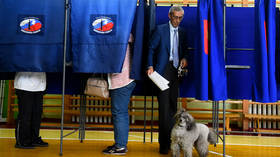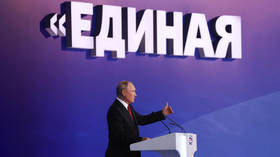Moscow's meddling bad, Western interference good: Ahead of next month's Russian elections, the hypocrisy is on full view again
27 Aug, 2021 11:29 / Updated 7 hours ago

The difference is that when America or its allies do it, it’s called “promoting democracy.” Now, a campaign to undermine the legitimacy of Russia’s parliamentary elections, due to be held next month, is explicitly linked to power politics. Any criticism of that approach, however, is denounced as an attack on democratic values themselves, in the wordplay used to legitimise the meddling.
Regime change
The US has a track record in this area. Washington has openly bragged about interfering in the 1996 Russian election to preserve Boris Yeltsin’s hold on power and keep out the Communists once and for all. However, its playbook is different when Washington wants to kick out the incumbent government rather than keep it in. A large apparatus for social engineering is unleashed under the guise of supporting “civil society” and democracy promotion in foreign countries.
Former covert operations by intelligence agencies have been outsourced to a variety of “international non-governmental organisations” that are almost completely funded by the US government and staffed by people affiliated with American intelligence. While they socially engineer mass pro-democracy and anti-corruption protests, these uprisings are then linked to supposedly home-grown desires for geostrategic changes, like joining NATO.
Regime change institutions include the National Endowment for Democracy (NED), Freedom House, the United States Agency for International Development (USAID), George Soros’ Open Society Institute, the International Republican Institute (IRI) and the National Democratic Institute (NDI). These institutions promote “democratic revolutions” from abroad by assisting with political legitimacy, financial support, training for organising anti-government protests, unifying the opposition under a specific leader and propaganda in terms of developing slogans, symbols and messaging.
They only target situations where Washington would benefit from a change in power. This is why you don’t see them operating in Saudi Arabia, Poland or Turkey, to give just three examples.
The US-sponsored playbook for manipulating civil society has been successful in Serbia (2000), Georgia (2003), Ukraine (2004 and 2014) and Kyrgyzstan (2005).
WikiLeaks revealed that a similar tactic for regime change was promoted by the US in Syria from 2006 by sowing distrust against the government, but also circulating propaganda about coup-plotting inside the state, as it “increases the possibility of a self-defeating over-reaction.”
The goal of regime change is winning a geopolitical victory, rather than achieving democracy. The “democratic revolution” in Georgia resulted in a pro-Western government that concentrated power in the presidency and cracked down on the opposition. Viktor Yanukovich, the president of Ukraine who was elected in what the Organization for Security and Co-operation in Europe (OSCE) characterised as a free and fair election, was toppled in a “democratic revolution” in 2014 that did not have democratic majority support in the population.
The present Western-backed government in Kiev has arrested the main opposition leader and cracked down on independent media. In Belarus, the opposition leader Svetlana Tikhanovskaya is depicted as the legitimate president, despite only 4% of the population saying that she is their choice to lead the country. Meanwhile, the most popular opposition figure, Viktor Babariko languishes in a Minsk prison, with rarely a word spoken or written about him in the international press.
Openness as a cover
Overt election interference is only possible by disguising it as “democracy promotion”, while elite-backed and manufactured shows of support are packaged up as “people power.” The new authorities that take power in these countries recognise it would not have been possible without support from the West, and are thus indebted.
In the 1980s, the CIA began to transfer responsibility for covert operations to “democratic non-governmental organisations”. Allen Weinstein, the co-founder of NED, acknowledged that “a lot of what we do today was done covertly 25 years ago by the CIA.” James Woosley, the former director of the CIA, was the head of Freedom House, which had a central role in organising the 2004 Orange Revolution in Ukraine. Michael Kozak, the former US ambassador to Belarus even bragged that he was doing in Belarus what he had previously done in Nicaragua.
ALSO ON RT.COMRussian Communist politician calls for Putin-supporting ruling party to be declared EXTREMIST ORGANIZATION ‘just like ISIS’USAID says that “Central and Eastern Europe and the former Soviet Union” have been declared the main targets of IRI and NDI due to “the significance of these regions to the United States”. Organisations such as Bellingcat have also been revealed to be government-funded and connected to intelligence agencies to disseminate disinformation against adversaries of the US-led NATO bloc. However, they don’t turn their fire on America or its allies, aside from the odd token gesture, designed to allow them to cite faux “balance.”
Targeting Russia
The political-media elites make it clear that removing Russian President Vladimir Putin from power is desirable and they are open about supporting the Russian opposition towards this end, yet insist that this in no way should be conflated with election interference.
Carl Gershman, the president of NED, wrote an op-ed in September 2013, five months before the coup in Kiev, saying that “Ukraine is the biggest prize” and the ability to flip the country to the West could bring the fight to Russia.
“Putin may find himself on the losing end not just in the near abroad but within Russia itself,” he argued. Gershman referred to opposition figure Alexey Navalny as a popular nationalist who could become a challenge to the state. In 2016, Gershman called for American politicians to “summon the will” to get rid of Putin.
The strategy of destabilising Russia by manipulating its civil society is openly advocated by think tanks closely linked to US intelligence. Case in point, the Rand Corporation advocates for undermining the legitimacy of the Russian government with “election upsets, mass protests, and civil disobedience”. It hails Navalny’s ability to stage protests, although cautions “it would seem highly inadvisable for Western intelligence agencies to attempt to cooperate directly with anticorruption groups inside Russia, such as Navalny’s Anti-Corruption Foundation. Such cooperation would undermine the effectiveness of those groups within Russia.” The now-disbanded Anti-Corruption Foundation is listed as a foreign agent by Russia’s Ministry of Justice and is considered an extremist organization.
Elections on the horizon
The State Duma elections are set for next month and the usual regime-change template is being prepared. Media reports are already suggesting that the elections will be illegitimate as the Russian government is putting pressure on Western “non-governmental organisations”. Furthermore, the OSCE international monitoring organisation will not send any observers after the government set limitations on the number it could have on the basis of Covid-19 guidelines. This will both hamper the ability to spot genuine manipulations of the vote and boost the prospects of ruling the poll invalid.
Of course, there are legitimate domestic concerns about ballots being rigged, with the opposition Communist Party vocal on this issue. These, though, go almost unnoticed by Western media and politicians, who apparently need no help with their own narrative.
How will the Russian election be portrayed? The EU Parliament already set the tone for the September elections in May, saying, “in the preparation and in the aftermath of the September 2021 parliamentary elections in Russia, when Mr Putin, in the same manner as Mr Lukashenko in Belarus, is waging a war against the people of Russia.”
The European Parliament opines that “the EU must be prepared not to recognise the parliament of Russia and to ask for Russia’s suspension from international organisations… if the 2021 parliamentary election are recognised as fraudulent”. As protests are incited and supported, the same politicians will insist that this is in no way election interference designed to destabilise Russia.
Democracy for some
Welcome to the rules-based international order where there are neither rules nor order. Open Western meddling in Russia is sold as legitimate and supportive of democracy, while alleged Russian interference in the West is branded illegitimate and an attack on democracy. If the Russian authorities reject an international system based on sovereign inequality, it merely affirms their hostility towards democracy and thus makes regime change all the more necessary.
The statements, views and opinions expressed in this column are solely those of the author and do not necessarily represent those of RT.



0 Comments:
Post a Comment
Subscribe to Post Comments [Atom]
<< Home